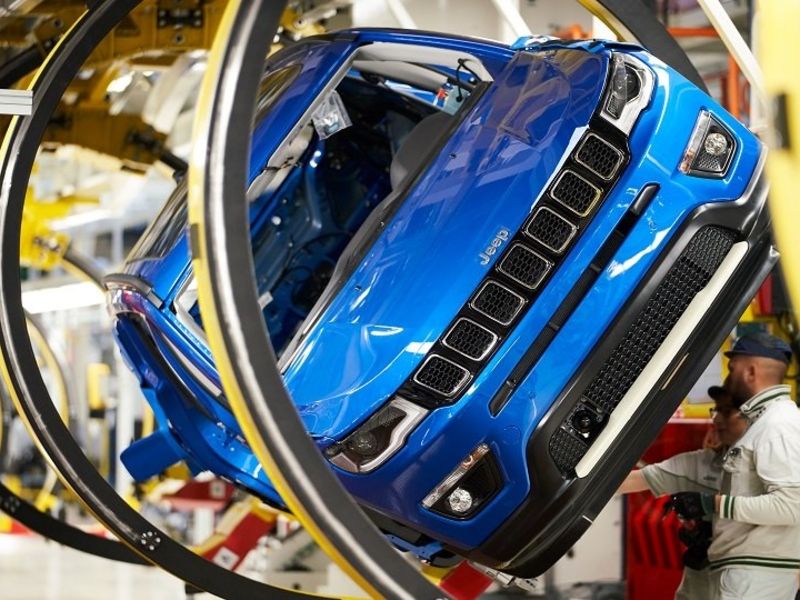
Stellantis will pause production at a factory in Italy that builds Fiat and Jeep vehicles because of reduced demand, and a shortage of microchips and other parts, Italian union sources said.
More than 7,000 workers at the plant in Melfi, southern Italy, will be furloughed for a week starting Monday, union sources said.
The factory builds the Jeep Compass and Renegade compact SUVs and the Fiat 500X compact crossover.
Stellantis, the parent company of Jeep and Fiat, confirmed the planned stoppage and said it was due to “market fluctuations” and other issues linked to the coronavirus crisis.
In a statement sent to Automotive News Europe, Stellantis said it was adapting its industrial activity “daily, plant by plant, to automotive market trends and by taking into account the different situations we are facing,” such as parts supply and pandemic confinements.
Italian news media reported the stoppage this week, citing union sources.
Global automakers have been caught off guard by the shortage of crucial semiconductors, used for everything from computer management of engines to driver-assistance features such as emergency braking, highlighting the need to cut dependency on Asian manufacturers. The chip shortage has led several automakers, including GM, Volkswagen, Ford and Toyota to cut vehicle production.
A union source said the main reason for the temporary production freeze was disruptions in part supply.
“We’ve been told by the company that several parts were affected, but that the main problems are with electronic ones, such as microchips,” he said.
The group is having particular problems obtaining an electronic part that is shipped from China, a second union source said, though he added that all carmakers were being affected, not just Stellantis.
Production was also halted at Melfi for two weeks in January, a measure that affected about half of the workforce.
The Melfi plant accounts for half of Stellantis’ passenger car production in Italy. Last year output fell by 7 percent to 229,848, according to the FIM union. An extended shutdown last spring because of COVID-19 restrictions was partly offset by the start of European production of the Compass and plug-in hybrid versions of both the Compass and the Renegade.
According to figures from JATO Dynamics, Fiat sold 58,467 500Xs in Europe in 2020, a 35 percent decline from 2019. Compass sales were 47,037, a drop of 26 percent; and Renegade sales were 58,617, a 25 percent decline, according to JATO.
Furloughed workers in Italy usually receive a reduced wage from a government “cassa integrazione” fund. That fund has been used since the start of the pandemic to cover most temporary layoffs attributed to the coronavirus crisis. The government has also forbidden permanent layoffs until March 31, 2021, in an effort to mitigate the impact of the crisis.
Other Stellantis plants in Italy have also been affected by production stoppages in 2021. Workers at the Mirafiori factory building the New 500 electric small car were laid off for three days this week, according to sources at the FIOM union. The halt was linked to problems in the supply of battery components, the sources said.
Also according to union sources, all 1,147 workers at the Grugliasco plant, where the Maserati Ghibli and Quattroporte sedans are assembled, were laid off from Jan. 18-26 and all of this week as well.
Grugliasco has long been among the least utilized European plants of the former Fiat Chrysler Automobiles, with merged with PSA Group to become Stellantis last month. Others with excess capacity include Fiat’s factory in Kragujevac, Serbia, which builds the Fiat 500L; and the Cassino plant in Italy, where all Alfa Romeos are built.
The Cassino plant has also been on short shifts since the start of 2021. Production restarted on Jan. 13 after a longer than usual Christmas pause, and was also stopped for two days, on Jan. 30 and Feb. 1.
Union sources said FCA had trimmed its Italian workforce ahead of the merger with PSA. According to figures from the FIM metalworkers’ union, the workforce at the Cassino plant has shrunk to 3,400 employees from 4,300 since early 2019, through early retirements and voluntary departures, and more than 1,000 workers left the two plants in the Turin area — Mirafiori and Grugliasco — in the same time frame, the union said.
FCA had been struggling for years with overcapacity in Europe. A recent report by Arndt Ellinghorst, an automotive analyst at Bernstein, forecast that utilization rates at the former group’s factories in Europe would be less than 50 percent, compared with competitors’ rates of 60 to 80 percent.
Reuters contributed to this report